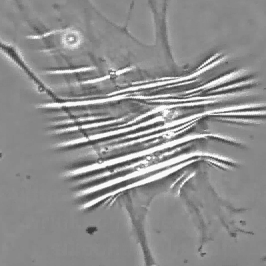at the Interface of Cell and Molecular Biology, Biophysics, Bioengineering and Clinical Research.
About Others
Related Research at UofT
Imaging Facilities
Societies
Canadian Connective Tissue Society
European Tissue Repair Society
Conferences
Dupuytren Disease Conference 05/25
Gordon Conference Tissue Repair 06/25
Seminars
About Us

The Hinz Lab in 2025 - Getting ready to float.
The research of the Hinz Lab focuses on the role of contractile myofibroblasts in physiological tissue repair and in causing pathological tissue fibrosis. Our team is a diverse group of scientists from various disciplines, all working together to drive innovation and make a difference in the world. Our mission is to use our knowledge to help develop new treatments for diseases, and to spread awareness of the importance of tissue repair. We believe in the power of collaboration and are dedicated to providing a welcoming and inclusive environment for everyone.
Our Mission

We aim to understand the mechanisms controlling myofibroblast function and how they influence the development of fibrosis. We carry out functional analysis of the cell's contractile apparatus (actin stress fibers), of force transmission at sites of cell-extracellular matrix contacts (focal adhesions) and of the mechanical cross-talk between contractile stress fibers of contacting fibroblasts at sites of cell-cell adherens junctions. We develop novel strategies to counteract myofibroblast malfunction by targeting these instrumental structures of the contractile phenotype.


Describe your image

Describe your image

Our Research
Myofibroblasts restore connective tissue integrity and contract the wound during tissue repair. Excessive myofibroblast activity is characteristic of the majority of fibrocontractive diseases. Following tissue injury, local fibroblasts and other mesenchymal cells, blood-circulating cells, epithelial and endothelial cells acquire smooth muscle features. Hallmark of this transition is the neo-expression of α-smooth muscle actin, generating high contractile activity in stress fibres. Of clinical relevance are the retractile phenomena caused by excessive myofibroblast activity characterizing the vast majority of fibrocontractive diseases. This includes fibrosis affecting vital organs, such as heart, liver, kidney and lung.


This site is under contraction...
Our Approaches & Tools



Our lab offers all standard cell and molecular biology equipment, plus unique microinjection and flow-chamber devices, culture membrane stretch devices, 2D/3D soft culture substrates, micromechanical testing, plasma etcher, silicone processer, real-time qPCR, microtome/cryostat/histology, digital luminescence and fluorescence documentation, cell electroporation, benchtop 8-channel flow cytometer, epifluorescence and confocal upright and inverted motorized microscopes, multi-well plate washer, UV spectrophotometer.
The Core Research Facilities at Unity Health (in-house) and at UofT (on campus) provide support with facilities for animal housing, cleanroom microchip fabrication, mass spectroscopy, deep sequencing, scRNAseq, peptide synthesis, mechanics workshop, electron microscopy, flow cytometry and sorting.
Dr. Hinz is also directing the Dentistry imaging facility CAMiLoD offering state of the art atomic force microscopy, electron and light microscopy instrumentation, image analysis stations, all with technical support. This is in addition to the outstanding imaging capabilities and support available at the St. Mike's Hospital imaging facility.
